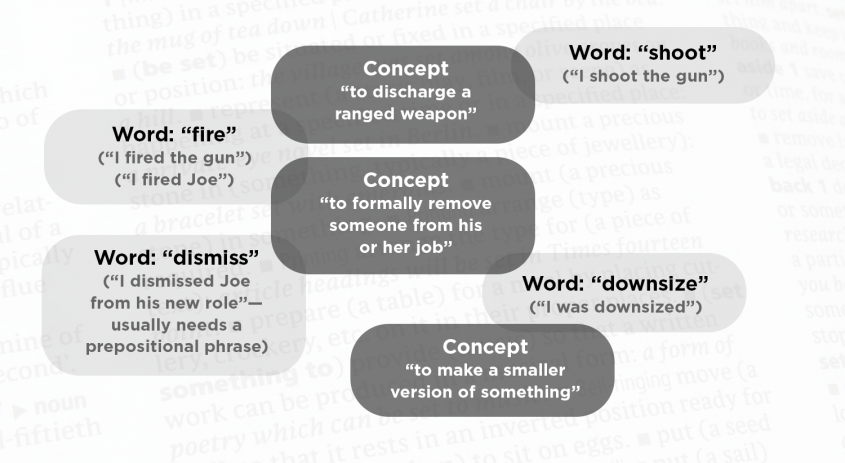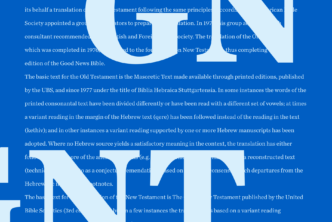A little knowledge can be a dangerous thing, especially when it comes to biblical words in the original Hebrew and Greek. Quite often preachers of God’s Word put too heavy a load on biblical words, expecting them to carry a major point of their sermon all on their own.
Yet the value of words lies not in their ability to create, in isolation, a new theological understanding, but rather in the fact that they contribute to sentences which then, in turn, alter our theological perception.
James Barr so painstakingly pointed this out over fifty years ago:
It is the sentence … which is the linguistic bearer of the usual theological statement, and not the word (the lexical unit) or the morphological and syntactical connection. Neither the Christian preaching nor the religious structure of ancient Israel … consisted primarily (if at all) in the issuing either of new words or of new word-concepts or of new conceptual ‘content’ for old words. The newness or uniqueness of the structure consisted rather in new combinations of words, in which it was often possible for the semantic value of the words to be changed only slightly or not at all, and for the new or distinctive concept to be indicated by the word-combination. (Barr, 2004, p. 263)
Barr’s point is that the Apostles did not need to invent new words or create ex nihilo new additions to a word’s range of meanings in order to advance their new theological ideas based on the work of Jesus Christ. Such advancement was done at the sentence level, not the word level.
Barr may have somewhat overstated his case. We do not wish to downplay the impact, even the lexical impact, that the Gospel itself may have had on the Apostles as they strove to write down the sheer indescribable wonder of the Kingdom of God. Such words as δικαιοσύνη, at the very least, take on new significance and implication.
Occasionally even Paul, finding existing Greek words insufficient to convey a concept, may have created an entire word from scratch, e.g., θεόπνευστος, “God-breathed.” (The word does not appear anywhere in published Greek literature up through the first century except for Second Timothy, though it does appear within the Papias material embedded in Eusebius.)
Nonetheless, one should assume that the inspired writers of Scripture, far from manifesting a “Holy Spirit language” which infused hitherto unknown theological meanings into words, utilized instead the semantic ranges of their day while relying on combinations of words to transmit their radical theological ideas. That is, they used words in such a way that their audience—usually a mix of Hellenistic Jews and Gentiles, most of them probably possessing a working knowledge of at least the Greek Old Testament—could understand.
That the New Testament was written in the Koine (or “common”) Greek of the day is almost universally accepted. As my doctoral advisor David Alan Black aptly summarizes, “The New Testament writers do on occasion rise to the literary heights of the Atticists, but on the whole the language of the New Testament parallels so closely the language of the papyri that there can be no doubt that it was written in the same vernacular Koine Greek” (Black, 1995, p.161).
Words are the building blocks of the sentence and so deserve to be studied on their own. Yet all sorts of mistakes lie waiting to ambush the careless expositor, mistakes that are all the worse because they may actually sound good from the pulpit to those unfamiliar with the Greek language (e.g., the common statement that “The Lord loves a ‘hilarious’ giver,” based on ἱλαριός 2Cor 9:7). The classic manual for helping preachers and students avoid such mistakes is D. A. Carson, Exegetical Fallacies (Grand Rapids, MI: Baker, 1984).
For anybody (like myself) who grew up in a foreign country speaking a second language, the question of how we know what words mean is not merely academic. Failure to understand how words work within our current social context will result in misunderstanding.
When it comes to handling God’s Word, there is an even greater danger that stems from the misuse of words, namely the danger of declaring “Thus saith the Lord” when, in fact, God has not spoken. The first half this discussion will focus on the difference between words and concepts, while the second half will introduce the reader to the idea of semantic range and how it interacts with context to determine meaning.
Words and Concepts: What’s the Difference?
The conflation of “word” and “concept” in the Theological Dictionary of the New Testament was the chief foil of James Barr’s The Semantics of Biblical Language.
Indeed, “The difficulty here is made much greater by what is one of the most irritating things about TWNT, the habit of the writers of saying ‘concept’ (Begriff) for the linguistic entity usually called a word” (Barr, 2004, p.210).
Modern scholars are sometimes guilty of the same mistake. For example, one of the most trusted modern systematic theologies states, “The word [πρόγνωσις] means more than simply having advance knowledge or precognition of what is to come. It appears to have in its background the Hebrew concept of ידע(yada), which often meant more than simple awareness. It suggested a kind of intimate knowledge—it was even used of sexual intercourse” (Erickson, 2004, p.382).
Yet there is no such thing as “the Hebrew concept of ידע” simply because “ידע” is a word, not a concept (and even Erickson shows awareness that this word points to different types of concepts, from “the state of possessing simple awareness of a person or object” to “the state of possessing intimate knowledge of somebody” to “engaging in sexual intercourse”).
It would have been more accurate to say, “The Hebrew word ידע can point to multiple concepts, including concepts which include more than simple knowledge.”By definition, “Concepts … are abstract entities” (Katz, 1972, p.38; cf. Church, 1951, pp.110-113).
I will take this a step further and suggest that “concepts are ideas, both abstract and concrete, which can be represented by words.” A concept cannot be tied down to a single word, because words change meaning over time while concepts are (if the reader will pardon some Platonic speculation) eternal in the mind of God.
In other words, the concept “a mode of transportation on four wheels that runs on gasoline designed to seat 1-6 passengers” is “out there” regardless of which word represents it, whereas words such as “automobile,” “car,” kuruma (Japanese), and voiture (French) are not inseparably tied to that concept, but may at a particular state of a language’s development point to that concept.
Already the astute reader will recognize just how “fuzzy” the relationship between word and concept becomes. The fact is, the concept “a mode of transportation on four wheels that runs on gasoline designed to seat 1-6 passengers” can be reflected in both the word “car” and the word “truck,” yet almost everybody would acknowledge that “cars” and “trucks” are two different things.
They may also point to other concepts in the same time period or may share the same concept with other words. As time progresses, the same word may cease pointing to one concept and point to another instead, making arguments based on etymology rather dangerous (more on this in the second post).

Key Points
In light of this discussion, here are two key points for the study of biblical words and concepts.
One word, multiple concepts
First, a word can point to multiple concepts, but usually not all at once. In my hermeneutics class, I have my students think of all the possible meanings of the English word “play” (just the verb), and they are usually able to come up with a minimum of six, sometimes more.
So “play” can mean “take part in a formal dramatic production” (e.g., “I played Hamlet in the college production”) or “participate in a structured athletic competition” (“He played football in high school”) or simply “to casually amuse oneself” (“go outside and play”).
Very rarely are any of those meanings implied at the same time. Playing Hamlet in the college dramatic production generally does not involve an athletic competition (though which of us would not pay good money to see Shakespeare combined with football?). Furthermore, playing in a football game may involve the opposite of amusement, especially when one is injured!
The point is that when we use a word, we usually only have one meaning in mind—the exceptions are those infamous puns, double entendres, and occasional deliberate ambiguities. When we give people the impression that a particular word has a whole bunch of meanings all at the same time, we are committing what is commonly referred to as the “illegitimate totality transfer” fallacy.
Likewise, when a biblical author uses a word, he almost certainly intends the reader to understand only one concept (though we cannot rule out occasional deliberate ambiguity).
One concept, many words
Secondly, on the other side of the coin, if you’re studying a concept in the Bible, you need to understand all the words and expressions that can point to that concept. In other words, you cannot claim to have completed a study of “God’s affection for his people” if the only passages you study are those that contain ἀγάπη.
You would also have to study φιλέω (e.g., John 16:27), as well as passages where neither ἀγάπη nor φιλέω occur but God’s love is still clearly being evidenced, such as Jesus’ death on the cross. As David Alan Black warns, “A theological concept cannot be discussed in an article about a single word” (Black, 1995, p.123).
So how, then, do we figure out what words mean? That will be the focus of the second post, as we look at “context” and “semantic range.”
Bibliography
Barr, J. (2004) The Semantics of Biblical Language, reprint. Eugene, OR: Wipf & Stock.
Black, D. A. (1995) Linguistics for Students of New Testament Greek, 2nd ed. Grand Rapids, MI: Baker.
Church, A. (1951) “The Need for Abstract Entities,” American Academy of Arts and Sciences Proceedings 80, pp. 100-112. Reprinted as Church, A. (2001 ) “Intensional Semantics,” pages 61-68 in The Philosophy of Language, ed. A. P. Martinich, 4th ed. New York: Oxford University Press.
Erickson, M. J. (2004) Christian Theology, 2nd ed. Grand Rapids, MI: Baker.
Katz, J. J. (1972) Semantic Theory. New York: Harper & Row.
Logos is packed with exceptional resources in which to study biblical words and their meanings. Be sure to check out the helpful, and free, instructional videos produced by the Logos Team to accelerate your mastery of Logos and to maximize efficiency in your study of the Bible.





